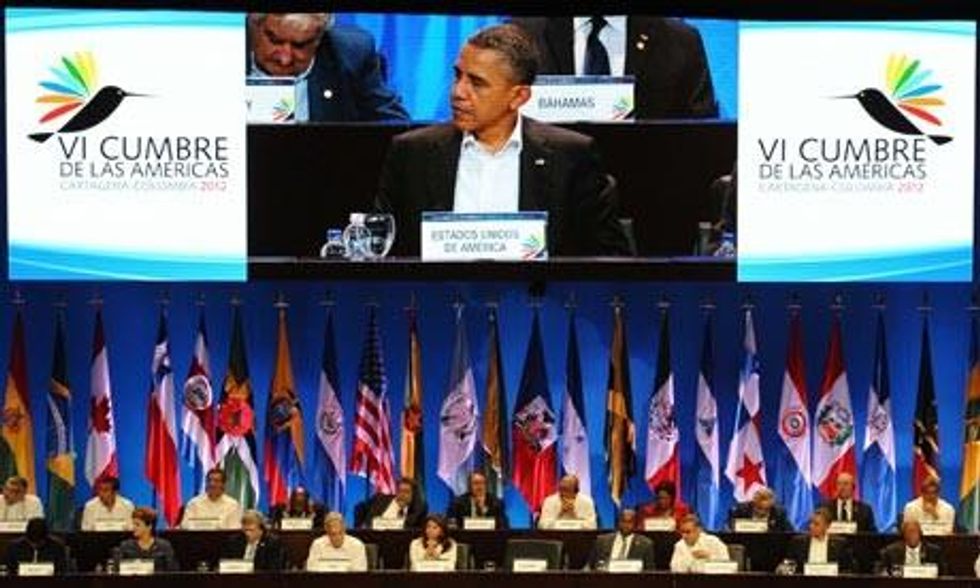Did Cartagena Mark the Beginning of the End of the War on Drugs?
Slowly but surely, world leaders are beginning to admit that their war on drugs is not working. Reform is now unavoidable
Dominated by Anglo/Latin discord and the improprieties of Barack Obama's entourage, the most recent Summit of Americas in the Colombian city of Cartagena appears at first glance to have been a waste of jet fuel. But while lurid tales of secret service agents behaving like hirelings on a piss-up tour make for tasty headlines, the summit could well be remembered not for its failures, but as the beginning of the end of the war on drugs.

The significance of what transpired over the weekend cannot be overstated: in years past, we've seen countless instances of former leaders, judges and law enforcement officers coming forward to argue the case for international drug policy reform, but this is the first time we've seen sitting governments openly discussing ending the war on drugs in a diplomatic setting. The success is largely due to the efforts of Guatemalan president Otto Perez Molina, who in the Guardian issued a passionate argument on behalf of reform, proposing "to abandon any ideological position (whether prohibition or liberalisation) and to foster a global intergovernmental dialogue based on a realistic approach - drug regulation".
In Cartagena, Molina successfully launched this dialogue, with leaders of the Organisation of American States agreeing to carry out a technical study on current drug policy that will be used to recommend alternatives. But it wasn't just those in favour of policy alternatives doing the talking; president Obama and Canada's prime minister Harper have also, in their own slow and disingenuous ways, begun to acknowledge reality. Although Obama has been clear that he opposes all forms of decriminalisation and legalisation, he admitted that drug reform was a debatable issue, stating: "I think it is entirely legitimate to have a conversation about whether the laws in place are doing more harm than good in certain places." Perhaps even more telling was Harper, who conceded at a press conference that the drug war was "not working".
What these kernels of reason suggest is that even for ideologues, the topic of reform has become unavoidable and that the political currency of polarisation is officially bankrupt. If we view Cartagena within the framework of a traditional war, what we have witnessed is the first draft of an armistice. The problem with the drug war, and the reason why it has taken so long for reformers to gain any traction, is that it has remained a niche issue due to its deeply classist nature. In a global context, developing nations endure the violence while the developed subsidise it, through both consumer demand and law enforcement funding. Within the developed countries a similar formula is reproduced; with poor neighbourhoods and demographics taking the place of their nation-state equivalents.
The corrosive results of this arrangement are obvious to anyone who has been paying attention. Public funds are diverted away from more worthy projects into the criminal justice system. Police are made to spend their days toiling as bagmen and bullies while other, more morally reprehensible crimes go unnoticed. Entire postal codes lose faith in their governments and many become completely alienated from those same police who are meant to protect them. Throughout the western hemisphere and Europe, the public's view of government has been subject to a lingering decay. The American public's trust in their government has never been lower, the same goes for Mexico, and last year's riots in England demonstrated exactly what happens when a nation operates on a shredded social contract.
The shift in language at the Cartegena summit presents a rare opportunity for a global policy renaissance that would have profound implications on how citizens relate to their governments. The Latin American nations that favour regulation have the requisite experience to understand the potential of policies based on reason and fact rather than theory and superstition. One can only hope that other countries, specifically those that have become so dependent on drug war infrastructure, will begin to take notice of what they have learned and adapt accordingly.
This is not an issue that should only be of concern to those regions or peoples who have been directly affected by cartels, corruption, addiction or incarceration. The dynamic of the drug war debate and the questions it raises are universal and fundamental to good governance and a worthwhile society.
An Urgent Message From Our Co-Founder
Dear Common Dreams reader, The U.S. is on a fast track to authoritarianism like nothing I've ever seen. Meanwhile, corporate news outlets are utterly capitulating to Trump, twisting their coverage to avoid drawing his ire while lining up to stuff cash in his pockets. That's why I believe that Common Dreams is doing the best and most consequential reporting that we've ever done. Our small but mighty team is a progressive reporting powerhouse, covering the news every day that the corporate media never will. Our mission has always been simple: To inform. To inspire. And to ignite change for the common good. Now here's the key piece that I want all our readers to understand: None of this would be possible without your financial support. That's not just some fundraising cliche. It's the absolute and literal truth. We don't accept corporate advertising and never will. We don't have a paywall because we don't think people should be blocked from critical news based on their ability to pay. Everything we do is funded by the donations of readers like you. Will you donate now to help power the nonprofit, independent reporting of Common Dreams? Thank you for being a vital member of our community. Together, we can keep independent journalism alive when it’s needed most. - Craig Brown, Co-founder |
Dominated by Anglo/Latin discord and the improprieties of Barack Obama's entourage, the most recent Summit of Americas in the Colombian city of Cartagena appears at first glance to have been a waste of jet fuel. But while lurid tales of secret service agents behaving like hirelings on a piss-up tour make for tasty headlines, the summit could well be remembered not for its failures, but as the beginning of the end of the war on drugs.

The significance of what transpired over the weekend cannot be overstated: in years past, we've seen countless instances of former leaders, judges and law enforcement officers coming forward to argue the case for international drug policy reform, but this is the first time we've seen sitting governments openly discussing ending the war on drugs in a diplomatic setting. The success is largely due to the efforts of Guatemalan president Otto Perez Molina, who in the Guardian issued a passionate argument on behalf of reform, proposing "to abandon any ideological position (whether prohibition or liberalisation) and to foster a global intergovernmental dialogue based on a realistic approach - drug regulation".
In Cartagena, Molina successfully launched this dialogue, with leaders of the Organisation of American States agreeing to carry out a technical study on current drug policy that will be used to recommend alternatives. But it wasn't just those in favour of policy alternatives doing the talking; president Obama and Canada's prime minister Harper have also, in their own slow and disingenuous ways, begun to acknowledge reality. Although Obama has been clear that he opposes all forms of decriminalisation and legalisation, he admitted that drug reform was a debatable issue, stating: "I think it is entirely legitimate to have a conversation about whether the laws in place are doing more harm than good in certain places." Perhaps even more telling was Harper, who conceded at a press conference that the drug war was "not working".
What these kernels of reason suggest is that even for ideologues, the topic of reform has become unavoidable and that the political currency of polarisation is officially bankrupt. If we view Cartagena within the framework of a traditional war, what we have witnessed is the first draft of an armistice. The problem with the drug war, and the reason why it has taken so long for reformers to gain any traction, is that it has remained a niche issue due to its deeply classist nature. In a global context, developing nations endure the violence while the developed subsidise it, through both consumer demand and law enforcement funding. Within the developed countries a similar formula is reproduced; with poor neighbourhoods and demographics taking the place of their nation-state equivalents.
The corrosive results of this arrangement are obvious to anyone who has been paying attention. Public funds are diverted away from more worthy projects into the criminal justice system. Police are made to spend their days toiling as bagmen and bullies while other, more morally reprehensible crimes go unnoticed. Entire postal codes lose faith in their governments and many become completely alienated from those same police who are meant to protect them. Throughout the western hemisphere and Europe, the public's view of government has been subject to a lingering decay. The American public's trust in their government has never been lower, the same goes for Mexico, and last year's riots in England demonstrated exactly what happens when a nation operates on a shredded social contract.
The shift in language at the Cartegena summit presents a rare opportunity for a global policy renaissance that would have profound implications on how citizens relate to their governments. The Latin American nations that favour regulation have the requisite experience to understand the potential of policies based on reason and fact rather than theory and superstition. One can only hope that other countries, specifically those that have become so dependent on drug war infrastructure, will begin to take notice of what they have learned and adapt accordingly.
This is not an issue that should only be of concern to those regions or peoples who have been directly affected by cartels, corruption, addiction or incarceration. The dynamic of the drug war debate and the questions it raises are universal and fundamental to good governance and a worthwhile society.
Dominated by Anglo/Latin discord and the improprieties of Barack Obama's entourage, the most recent Summit of Americas in the Colombian city of Cartagena appears at first glance to have been a waste of jet fuel. But while lurid tales of secret service agents behaving like hirelings on a piss-up tour make for tasty headlines, the summit could well be remembered not for its failures, but as the beginning of the end of the war on drugs.

The significance of what transpired over the weekend cannot be overstated: in years past, we've seen countless instances of former leaders, judges and law enforcement officers coming forward to argue the case for international drug policy reform, but this is the first time we've seen sitting governments openly discussing ending the war on drugs in a diplomatic setting. The success is largely due to the efforts of Guatemalan president Otto Perez Molina, who in the Guardian issued a passionate argument on behalf of reform, proposing "to abandon any ideological position (whether prohibition or liberalisation) and to foster a global intergovernmental dialogue based on a realistic approach - drug regulation".
In Cartagena, Molina successfully launched this dialogue, with leaders of the Organisation of American States agreeing to carry out a technical study on current drug policy that will be used to recommend alternatives. But it wasn't just those in favour of policy alternatives doing the talking; president Obama and Canada's prime minister Harper have also, in their own slow and disingenuous ways, begun to acknowledge reality. Although Obama has been clear that he opposes all forms of decriminalisation and legalisation, he admitted that drug reform was a debatable issue, stating: "I think it is entirely legitimate to have a conversation about whether the laws in place are doing more harm than good in certain places." Perhaps even more telling was Harper, who conceded at a press conference that the drug war was "not working".
What these kernels of reason suggest is that even for ideologues, the topic of reform has become unavoidable and that the political currency of polarisation is officially bankrupt. If we view Cartagena within the framework of a traditional war, what we have witnessed is the first draft of an armistice. The problem with the drug war, and the reason why it has taken so long for reformers to gain any traction, is that it has remained a niche issue due to its deeply classist nature. In a global context, developing nations endure the violence while the developed subsidise it, through both consumer demand and law enforcement funding. Within the developed countries a similar formula is reproduced; with poor neighbourhoods and demographics taking the place of their nation-state equivalents.
The corrosive results of this arrangement are obvious to anyone who has been paying attention. Public funds are diverted away from more worthy projects into the criminal justice system. Police are made to spend their days toiling as bagmen and bullies while other, more morally reprehensible crimes go unnoticed. Entire postal codes lose faith in their governments and many become completely alienated from those same police who are meant to protect them. Throughout the western hemisphere and Europe, the public's view of government has been subject to a lingering decay. The American public's trust in their government has never been lower, the same goes for Mexico, and last year's riots in England demonstrated exactly what happens when a nation operates on a shredded social contract.
The shift in language at the Cartegena summit presents a rare opportunity for a global policy renaissance that would have profound implications on how citizens relate to their governments. The Latin American nations that favour regulation have the requisite experience to understand the potential of policies based on reason and fact rather than theory and superstition. One can only hope that other countries, specifically those that have become so dependent on drug war infrastructure, will begin to take notice of what they have learned and adapt accordingly.
This is not an issue that should only be of concern to those regions or peoples who have been directly affected by cartels, corruption, addiction or incarceration. The dynamic of the drug war debate and the questions it raises are universal and fundamental to good governance and a worthwhile society.

